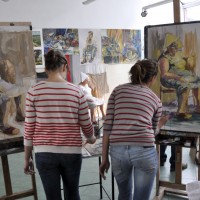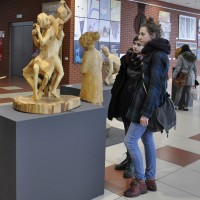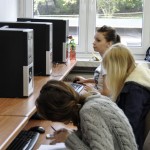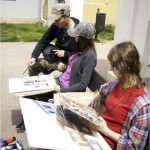The Norwid Secondary School of Fine Arts in Lublin is the only school of its type in the voivodeship. It consists of a 6-year secondary school of fine arts (OSSP) and a 4-year art secondary school (LP). The Minister of Culture and National Heritage is in charge of the school. The first type of school includes a 3-year lower secondary school (gymnasium) which is followed by an exam and 3-year secondary school (lyceum). All students finish school once they pass a diploma exam, which confirms that they have completed the preparation for the profession of an “artist”. They can also take the Maturity examination (matura), which is necessary if they want to enter a university.
The unique character of our school is created by a small number of students – about 250 students taught by 52 teachers. It has its advantages. First of all, the fact that the groups are small (for art subjects, foreign languages and the history of art) gives the teachers the possibility to have close contact with the youth. It helps the teachers treat each student subjectively, and the students develop stronger social bonds. The students from outside Lublin can live in the Art School Dormitory.

There are three types of subjects at the school: general education subjects realising the Ministry of National Education’s Curriculum (lower secondary school and secondary school), vocational subjects which provide qualifications for the profession of an “artist” (specialities: visual advertising, graphic techniques, photography and film, functional forms) and general art subjects, which are taught to all grades, irrespective of the specialities. Since the school year 2014-2015 there have been two Curricula for the vocational art subjects at the school: the so-called “old” Curriculum, which will end in 2019 for the 6-year secondary school (OSSP) (only the speciality of visual advertising) and in 2017 in the 4-year secondary school (LP) (classes are divided into three groups: visual advertising and functional forms within two specialisations: artistic tapestry and woodcarving, and also the so-called “new” Curriculum, which includes:
- education within three specialities: in the 6-year secondary school (OSSP) (functional forms: specialisation – space arrangement, graphic techniques: specialisation – graphic design as well as photography and film: specialisation – artistic photography) from 3rd class.
- education within two specialities in three specialisations in the 4-year secondary school (LP) (graphic techniques: specialisation – graphic design and functional forms in specialisations: artistic tapestry and woodcarving.
Additionally, the students have the opportunity to study the subject they have chosen in modular obligatory lessons: multimedia and photography, and artistic team projects (in the 4-year secondary school (LP) from the school year 2015-2016, in the 6-year secondary school (OSSP) from the school year 2016-2017). Exceptionally talented students will be able to attend additional lessons in art and vocational subjects in the last two years of secondary school. Education within the vocational art subjects, which also include history of art, is provided on the basis of the Curricula in art schools by the Ministry of Culture and National Heritage. The organisation of the lessons meets the Occupational Safety and Health requirements as well as includes workshops: vocational art subjects, apart from the History of Art are taught to students in each grade. The students are divided into groups of a few, but not more than twenty people. It helps to build “student-master” relations.
The teachers are university graduates, who have been employed in compliance with qualification requirements, which specify the qualifications needed for teaching respective subjects. A number of teachers have qualifications which allow them to teach more than one subject, which is why they create their own interdisciplinary curricula. At the school, apart from the system of lessons, there are additional classes for those who want to develop their interests: music, theatre, literature and art, which go beyond the curriculum. The school’s offer is enriched by the optional or obligatory participation in exhibitions, reviews of the works, open-air paining and workshops, which give the students the possibility to confront their peers from their own country and abroad.

The school cooperates with other schools in Poland and in Europe, with both secondary schools and universities, especially with the Maria Curie-Skłodowska University, the Catholic University of Lublin, the Jan Matejko Academy of Fine Arts, the Academy of Fine Arts in Warsaw, and for some time now, also with the University of Wolverhampton and the J.I.Kraszewski school in Vilnius.
The school cooperates with other schools in Poland and in Europe, with both secondary schools and universities, especially with the Maria Curie-Skłodowska University, the Catholic University of Lublin, the Jan Matejko Academy of Fine Arts, the Academy of Fine Arts in Warsaw, and for some time now, also with the University of Wolverhampton, the J.I.Kraszewski school in Vilnius and the Lisienko school of art in Sumy.

At the school, there is an association “Lubelski Plastyk”, which organises art courses, auctions, fairs and open-air painting. It is also a co-organiser of international events: International Artistic Sculpture Workshops (5 editions), the “Family Portrait” biennale (8 editions) and countrywide methodological workshops addressed to art school teachers.
The students can use modern classrooms equipped with multimedia equipment and places, which enable them to produce their works using different materials and techniques. There is also a library with a multimedia information centre as well as wireless Internet access in the building. Multimedia is also used in general education classes. The school has a lot of specialist rooms, a gallery, dentist’s surgery, gym and a big hall with stage equipment. The students’ safety is ensured because of the ideal location and surveillance. An electronic register is used. Around the school, there is a vast space used as a place for art workshops, outdoor galleries and doing sports in PE classes.
In the last years, the school, which is a building from the 1970s, has undergone renovation connected with thermo-modernisation. The contemporary appearance of the building has been achieved by a new colour scheme.
The school offers guidance to those interested in art education, which enables to determine candidates’ abilities and aptitude for art. It also organises so-called “The Day of Open Doors”, which is on the last Friday of April.
You are welcome to visit our website: www.liceumplastyczne.lublin.pl
Headteacher of the Secondary School of Fine Arts in Lublin












